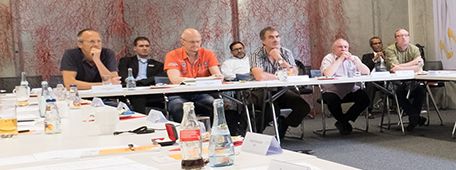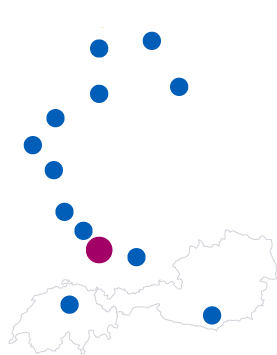City of Dillenburg
Efficient, paperless file management
Challenge
The idea of the paperless office has been around for many years. Although it still remains elusive, many areas are implementing it more thoroughly today. Municipal financial departments are advancing the topic of digitization in particular, since their role has recently changed. Increasingly, such departments are asked to handle a variety of new tasks, while observing numerous laws and regulations. This will be impossible in the future without consistent digital support.
Gains in efficiency offered to administrations through automating processes, in contrast, are substantial. Electronic file processing, in particular, adds a great deal of efficiency. Its advantages are clear: It helps reduce the pile of files, increase processing speeds significantly, and facilitate business processes with no media disruptions. At the same time, the E-file is the basis for digital solutions under the Online Access Act, which is slated for implementation by 2022.
However, thorough digitization of administration is more like a marathon than a sprint, and requires both structural and technological preparation. The city of Dillenburg (ancestral seat of the house of Orange), is well aware of this, having decided to take on the challenge of becoming faster, more efficient, and more transparent, while using less paper over the long term. To do so, it chose to work with two forward-thinking digitization solutions. The Hesse city took the first step in 2017 with the help of an accounting workflow, after an organizational assessment of its administration and review of all former procedures. It took the next step just a year later: introducing the electronic file.
As long-term users of Infoma newsystem financial accounting, Mona Hafer and Reiner Pulfrich from the Financial department decided to use the support of Axians Infoma and available integrated digitization components in these projects as well, following an intensive information-gathering phase. The goal was to make the everyday invoice processing procedure quicker and more structured, while ensuring that invoices could be tracked and that electronic invoices could be processed (a requirement starting in 2020). However, it was also highly important to the project managers that all electronic processing could be handled apart from any specific workplace/location as well. The city has multiple administrative buildings, and also works on inter-municipal projects with the borough of Sinn. The administrations have been working together successfully on finances since 2017, and are putting their responsible handling of personnel and financial resources to the test by using these synergy effects.
The city of Dillenburg had a clear idea of what it wanted to achieve by using the electronic tax file. “Simply from a physical standpoint, we wanted to get rid of our giant filing cabinets,” remembers Reiner Pulfrich, Head of the Finances department. “In terms of processes, our focus was on having direct and fast access to files from the tax object at all times, especially in light of our collaboration with the borough of Sinn. These files needed to be accessible both from work stations in the Dillenburg tax department and in Sinn as well.”
Solution
Implementing these performance features fulfilled a large portion of this list of requirements. Integrated into existing financial accounting, documents can be filed, searched for and processed from the familiar environment, without having to access a DMS system. “Our desire at the time was to handle property, commercial, dog, playground and entertainment taxes via a paperless process” says Conny Göbel, Head of the Tax Department. “Today, we no longer staple assessments and other correspondence together; instead, we just scan it in and it is filed directly and automatically in the tax object. In addition, automated archiving of tax assessments when they are printed eliminates the need to save them as a PDF.
The solution has become routine after more than a year of use, and is clearly the result of good planning. What should work processes look like in the future, from incoming mail to processing to filing? What historical data are adopted into the e-file? What types of documents do we have to identify in order to structure filing, based on the document types in the tax files? What scanning requirements do we need to implement to ensure that tax assessments received in paper form in a network folder can be filed in the E-file?
The city had to answer this and many other questions in advance. Employees, who had been used to working with paper files, needed to be involved in the considerations as well. Access rights, for instance, were discussed and established by the team. Employees also received a second screen to improve their work process when handling electronic files.
Filing orders were set up for the assessments generated from Infoma newsystem, ensuring they would be archived correctly. Conny Göbel explains: “To ensure immediate access, we decided archiving should be carried out directly after printing and not during a night run.”
Benefits
For employees in the tax department, the benefits of the electronic file were clear after just a short time. They can still work on their familiar interface, without normal filing work or paper archiving, and can access information immediately – a feature that garnered positive reactions from taxpayers making inquiries. Dillenburg is now considering implementing the E-file in other areas as well, such as fixed-asset accounting.
The project managers are also satisfied with the status quo: “One of the biggest advantages is clear not only to employees, but also to tax-paying citizens as well. Giving authorized employees immediate access to documents at any time and from anywhere allows them to find and provide information more quickly. In addition, all new files are immediately created in digital form, eliminating storage space and costs over time, and the need to walk back and forth to the filing cabinet.
Reiner Pulfrich also feels E-files hold options for the future as well. Options for sending assessments via e-mail and receiving tax assessments from the tax authorities digitally, then filing them directly, are on their wish list. This will get them another step closer to their goal of almost fully paperless administration.
The city of Dillenburg had a clear idea of what it wanted to achieve by using electronic tax files. Simply from a physical standpoint, it wanted to eliminate giant filing cabinets. In terms of its procedures, the city's aim was to ensure fast, direct access to files from tax objects at all times. The local government was so successful in implementing this plan that it is now considering using e-files in other areas as well, such as fixed-asset accounting.
Key data
Product Infoma newsystem Electronic File
State Hesse
Number of inhabitants
23.726
In Dillenburg, all new files are immediately created in digital form, eliminating storage space and costs over time, and the need to walk back and forth to the filing cabinet.


























